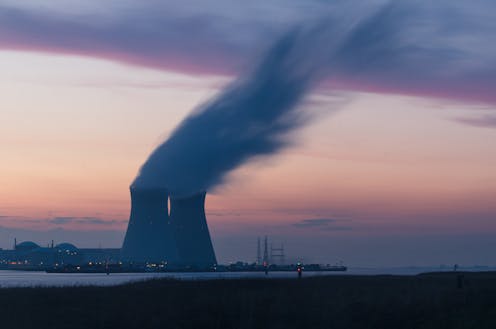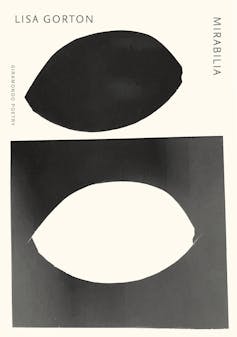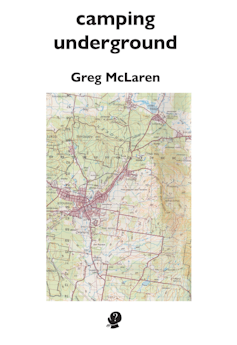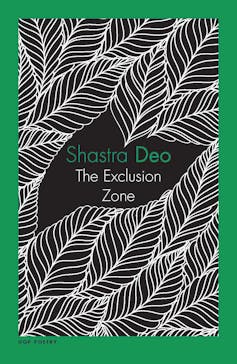
It seemed to me for many years that thoughts of nuclear catastrophe were anachronistic. Was that ignorance and complacency on my part? Probably. After all, there were always rumblings about proliferation, Iran and North Korea, India and Pakistan and Israel. But they did not feel like existential threats to those of us living in Australia.
Am I alone in feeling this way? Was it less a question of the tyranny of distance than anaesthetising privilege? Terrorism, yes – domestic and international – but not nuclear catastrophe.
Three recent books of Australian poetry – Lisa Gorton’s Mirabilia, Greg McLaren’s Camping Underground, and Shastra Deo’s The Exclusion Zone (as well as the Sydney Theatre Company’s forthcoming adaptation of Nevil Shute’s 1957 novel On the Beach) – suggest that the nuclear question is back.
The most obvious and important reason would seem to be the war in Ukraine and Vladimir Putin’s bellicosity, but AUKUS and Australia’s plans to acquire nuclear-powered submarines and renascent debates about nuclear power more generally are also relevant.
The Exclusion Zone – Shastra Deo (University of Queensland Press); Mirabilia – Lisa Gorton (Giramondo); Camping Undergound – Greg McLaren (Puncher & Wattmann).

Gorton, McLaren and Deo all speak to this context. Their books are concerned with “apocalypse” in both the common and the more specific sense of the word. Broadly, their shared theme is (to cite the OED definition) “a disaster resulting in drastic, irreversible damage to human society or the environment”. Their shared purpose is to uncover or disclose – to reveal – something about our present circumstances and anxieties.
McLaren’s book is a verse novel with an overarching narrative, whereas Gorton’s and Deo’s are collections of individual poems and sequences, and therefore have a wider variety of preoccupations and tones. But another important distinction, and perhaps one we don’t think about enough when we think about poetry, is that Camping Underground is a work of fiction, while Mirabilia and The Exclusion Zone are not.
That may sound banal, but I believe this distinction is crucial to the power we ascribe, or want to ascribe, to contemporary poetry. I want to say that non-fiction poetry and lyric poetry – autofiction with the “meh” wrung-out? – hit the mainline in this regard.
Staging the end of the world
Camping Underground brings the apocalypse to the south-east coast of Australia:
Cessnock. Where else
would you stage
the end of the world?
McLaren’s lines allude to a wisecrack attributed to Ava Gardner, one of the Hollywood stars of the film adaptation of Shute’s novel: “On the Beach is a story about the end of the world, and Melbourne sure is the right place to film it.”
Such wry humour is typical of Camping Underground, and it is always pointed. For instance, having been told of
The Foxtel Dawn Service,
led by the VB Governor-General,
it’s fair that readers later assume the Governor-General to be the victim of a shooting “at Yarralumla”. The jokes have a satirical purpose: the culture is on trial, not just our politicians.
Structurally, Camping Underground alternates between sections titled “Before” and “After”. It tracks the life and reflections of Kelly Edwards, who is implicated in unforgiving (and perhaps unforgiveable) acts of political violence. She is variously on the run or hiding out – or rather in, for the title refers to an abandoned mine in the Hunter Valley.
In the “After” sections, there isn’t much left of Sydney. There are rumours of “people coming down from the north”, landings of Chinese or Indonesian ships, and “boats full / of people escaping nuked Iran.” No one is sure what is happening; post-truth survives, if not fuels, the apocalypse. We learn that law and order have broken down, that terrorism and anarchy prevail. There are atrocities aplenty:
The truck bomb at Lucas Heights
was a feint,
the clever stupid bastards
just as the AFP went into Kirribilli House.
Another squad of the Blue Cross went in
as the Mack went up, wearing burqas.
They blew the shit out of the reactor
and left only their shaky live feed
and a bloated ellipse of suburbs dusted
by the unexpected southerly.
The thefts from oncology departments
at RPA and John Hunter: that was them too,
so they said – that stuff found its way
into dirty bombs along the eastern seaboard
those long three days after.
Lucas Heights, we remember, is the site of Australia’s only nuclear reactor. To imagine it falling prey to a terror attack is appalling; we are grateful this is fiction. Still, it is desperate stuff, and though it may seem incongruous to alight on such a striking phrase as “a bloated ellipse of suburbs”, to do so heightens the awfulness of those suburbs being “dusted” with the fallout.
The beauty of the phrasing, as with the moments of humour, speak to humaneness under duress, but resisting. This is an important point, for in the apparent disconnect between aesthetics and subject matter, we are reminded of literature’s singularity; it does not mimic resistance, but becomes it.
Another example:
The clouds, their small
crackling fissures of light –
opening like an ice sheet.
How to balance such lyrical moments with the dirty bombs, including one
in the maternity tent
of the internment camp.
Another clip
of kids’ feet
poking out from under tarps.
It is a shocking image, all too familiar to anyone who reads or watches the news; we have seen this, and we know we will see it again. And yet elsewhere McLaren admits some light.
I try to learn a place by watching
what birds do above it.
Is this gallows beauty? After all, don’t birds circle above dead animals? Yes, and yet the image hints at redemption. After all, “I try to learn”.
I don’t know why
you wouldn’t believe in the redemptive
power of literature, or doubt
its real-world applications.
This brings me back to the relative merits – the “real-world applications” – of non-fiction and lyric poetry, as opposed to poetry that is (more) overtly fictional. On this point, I would say there is a continuum, or a spectrum, from non-fiction to fiction, rather than two entirely separate buckets.

We might ask, then, what is the “real-world application” of Camping Underground? It cannot be witness or consolation, for its apocalypse – the disaster it invents, or “stages” – is a fiction, a speculation, and one cannot be consoled pre-emptively.
Are we being prepared or warned? It seems facile to label Camping Underground a cautionary tale. Do we need 180 pages of verse novel to ward us off anarchy and disaster, or tell us that the culture is in trouble? McLaren’s book has other virtues, but on the point of literature’s “real-world applications”, which he himself raises, I can’t help feeling that the overt fictionality lessens its effectiveness.

Read more: Adam Aitken: a forensic poet with obsessive resolve
An urgent need
The matter and materials of science and history are important to Shastra Deo’s The Exclusion Zone. The first section refers regularly to the nuclear disasters at Fukushima and Chernobyl, which creates a more chilling effect than if fictional counterparts had been invented.

The titles of the poems are wonderful, evocative things. Here is a selection, which I may try to publish as a cento: Fukushima Soil, Canto for Sumitomo Bank (Hiroshima Branch), Pavlovsk Station, Undertakers of the Atom, Przewalski’s Horses Are Back in Belarus, View of the Sky from an Imagined Lake in June.
That final title belongs to a visual or concrete poem that creates a constellation of star symbols and corresponding footnotes to convey its meaning. It is terrific, and worth the cost of admission. But this first section is complicated and, at least for me, somewhat undermined by Aubade (Earth-TRN688), which apparently has something to do with Marvel (the comic universe, not Andrew).
It is not the subject matter of Aubade (Earth-TRN688) that is the problem, but rather its being uncommunicative for those outside the know. What do we do when we encounter such a poem? Perhaps if I hadn’t been writing an essay, I would have skipped it. Having said that, I will test my impatience by setting the poem on an undergraduate creative writing course to see if students, several of whom are gamers, have a better sense of it.
One of the The Exclusion Zone’s two epigraphs comes from Wilfred Owen: “All a poet can do today is warn.” With due respect to Owen, and to Deo, I think the collection does more than this. It is not just a warning when one writes about the horrors of the past, but also an act of testimony and respect. To remember is an urgent need.
What I mean to say is here
you must forget a thing to kill it.What I meant to say was everything
oh
everything lives.
This is the collection’s central claim. It is both an ethics and an intellectual idea. The suggestion – and I think it is persuasive – is that the past remains alive. It needs our care and attention, both actual and imaginative. Only in weighing the materials she has to hand can the poet go to work on them.
These lines are from Search History:
The story of matter is this: nothing dies.
Patterns of information, electricity
and biochemicals, deep web of nerve and neuron, limb
and stem, remake to microbe and geosmin. Leaf litter
of an ever-season. Smell of soil after rain. The
matter of matter is this: nothing
is storyless, not even the dead.
I found this beautiful, but confess I had to look up geosmin. Google’s top response, from the American Chemical Society, made things perfectly clear: “a natural bicyclic terpene with an earthy odor.” (I’ll do as McLaren did and borrow from John Forbes: “Thanks. Thanks a lot.”) Deo tells us as much – “Smell of soil after rain” – which raises the question as to why the word geosmin was necessary.
It’s for the sound, I suspect, and the rhythm. And yes, it does sound cool. Still, it is the first and last lines of the stanza – if we include “nothing” from line six – where the meaning is made.
As with Camping Underground, there are hopeful gestures throughout The Exclusion Zone, none more so than in Poem for My Son in the Years of a Hot War:
Every day the wash of light
over bedcovers. Your hand. Your
cheek. Your eyelid, lifting.
McLaren and Deo are not afraid of love; they insist upon it.

Wondrous, terrible things
The author’s note that accompanied my copy of Lisa Gorton’s Mirabilia is enormously enlightening, and I wish it could have been included in the Notes section of the book. I can understand why publishers don’t do this – it adds to the cost, doesn’t it? – but it is a pity for readers to miss out on the poet’s musings.
This, for example, is Gorton’s reflection on the stunning title poem:
I wrote the title poem in one of Melbourne’s lockdowns – a poem about pangolins, the most-trafficked mammals on earth, implicated in the evolution of Covid-19; they die in captivity […] “Mirabilia” is written in Fibonacci syllabics to imitate how a pangolin spirals up into itself; also, as a lament for that pattern of growth and return, which has lived in the background of poetry’s images for so long.
Is this left out of the book but provided to reviewers so that people like me can look smarter than we really are? (“Fibo-what? Thanks. Thanks a lot.”) Gorton’s take on her various themes and poems is fascinating. I liked the house having extra windows; it gave the book more oxygen, more life.
Mirabilia is comprised of three sections – Muse, Tongue, and Great World Atlas – each alive to the unwritten, or unheralded, people and experiences of history. Muse and Tongue contain ekphrastic poems and poems concerned with the figure of the female muse. On the Characterisation of Male Poets’ Mothers is both funny and scathing. As a reader of Baudelaire, Rilke, Rimbaud and Larkin, one cringes at their narcissism and petulance, their cruelty.
It is Great World Atlas, the final part of Mirabilia, in which Gorton tackles the theme of nuclear testing and its cover-up. These poems are also ekphrastic, in that they were written to accompany the work of artist Izabela Pluta. There are only five poems in the sequence, but in total they run for some sixteen pages. Here is an excerpt from the second poem, The Reader’s Digest Great World Atlas 1961 (1962):
Between the time of its publication and fourth revise they
exploded the bomb they called Vanya over Novaya Zemlya –
its fireball five miles wide hung a second sun over the
island – its cloud rose into the mesosphere – black rain over
the Kara Sea, Barents Sea, Alaska, Norway, Finland, Ukraine,
northern Canada … Between the time of its publication and fourth
revise they exploded the bomb they called Starfish Prime off
Johnston Atoll over French Frigate Shoals, high inside the
thermosphere – Its aurora – a blinding white flash, green
sphere of light, vast cloud outflung in turning arcs, in circles
sweeping outwards … Between the time of its publication and
fourth revise they exploded plutonium over the saltbush
scrub of Maralinga, at Taranaki, north of the straight train
line across the Nullarbor, in secret trials they had named
Operation Tims and Operation Vixen – its plumes, a
hundred miles long, drifted on the wind – They had taken
the sacred objects, trucked the people south across the rail
line to the coast of Yalata – She said, “Where are we going?
We are going to a place we have never been to –”
I found this poem profoundly affecting, much in the way of reading Natalie Harkin’s Archival Poetics (2019). It is a litany of actual horror and misdeed, of experiment and consequence and appalling indifference.
In her author’s note, Gorton says that she was “thinking about the nature of historical memory, which lets a few images stand in the place of what has been forgotten, or concealed”. I think, for now and not finally, that this is where the power of contemporary poetry resides – in the blood of the actual – and that, perhaps, is a vital sign.
Reading Great World Atlas, having read Harkin – and Ali Cobby Eckermann, Evelyn Araluen, Ellen Van Neerven, and others – one wonders, finally, to whom does Gorton’s “they” refer?
One knows one is one of them, but wishes to demur.
Craig Billingham has previously received funding from the Australia Council for the Arts. Izabela Pluta is a fellow employee of UNSW.
This article was originally published on The Conversation. Read the original article.







